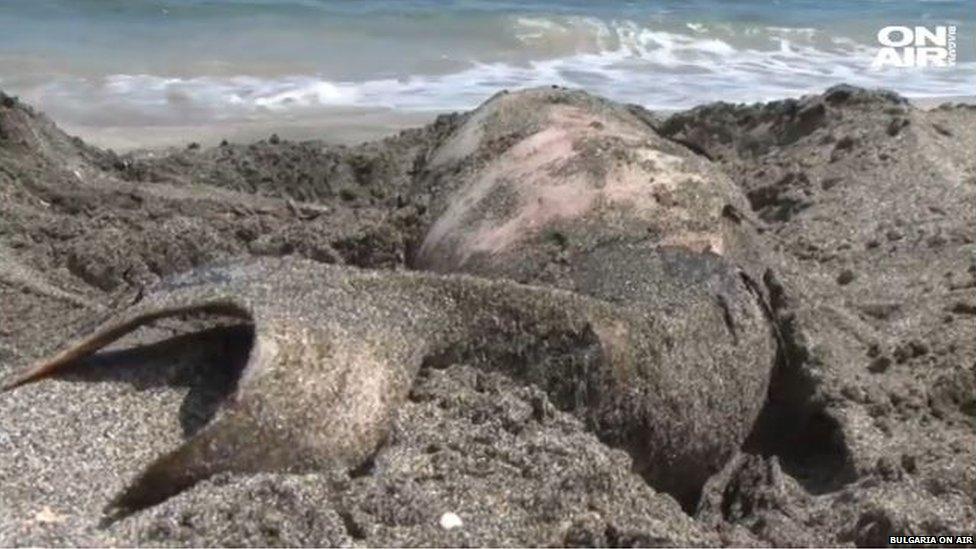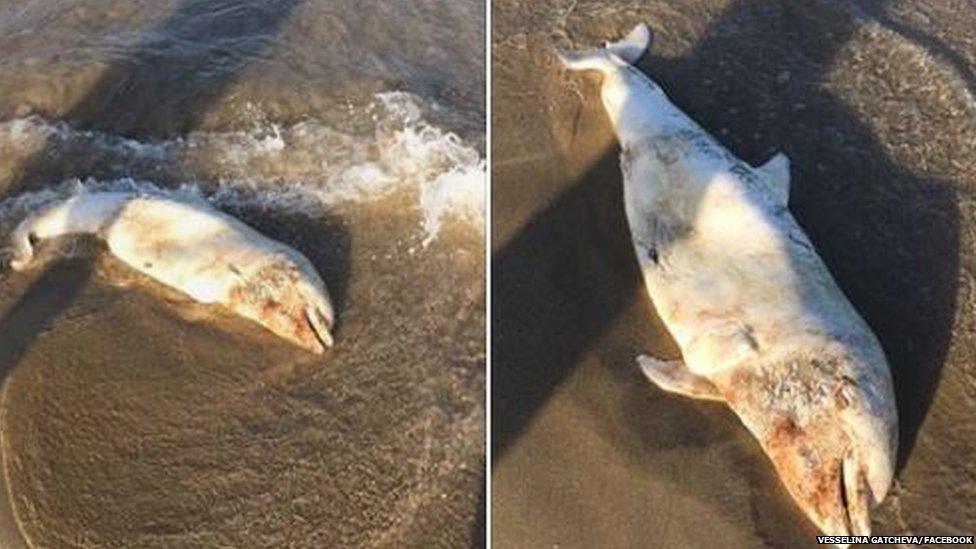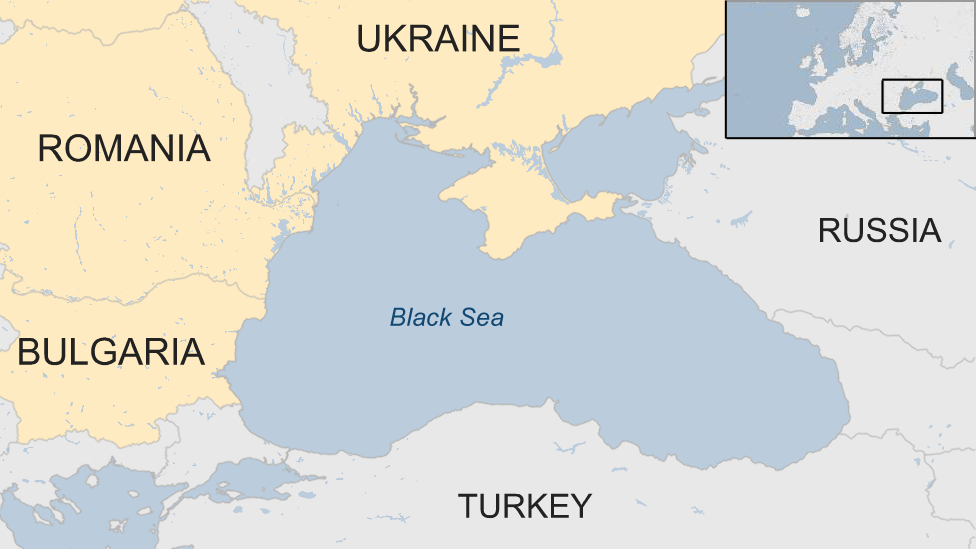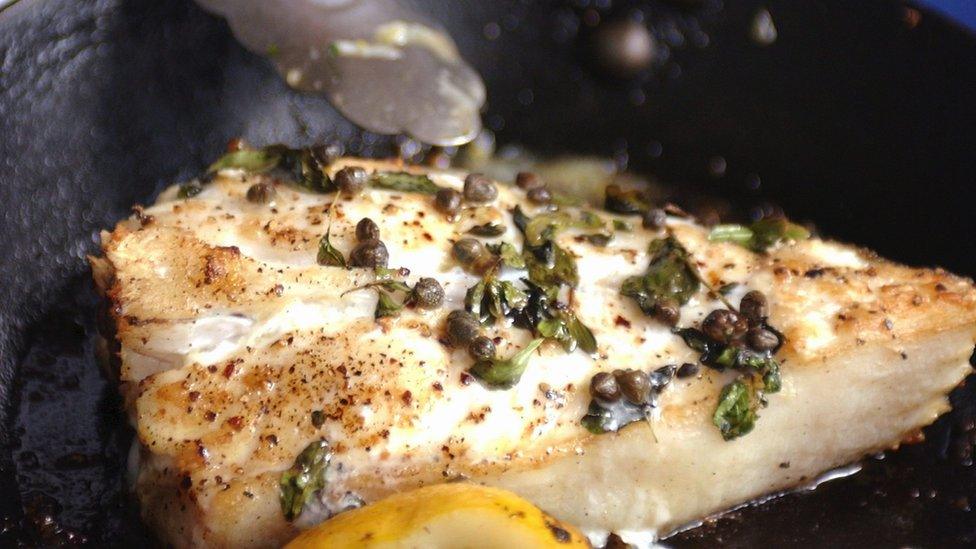Bulgarian dolphin deaths could be linked to illegal fishing
- Published

Activists fear the species is being hit hard by illegal turbot fishing
The discovery of a headless baby dolphin on a Bulgarian beach recently shocked holiday makers, and pushed an old story back into the headlines, external.
There have been reports of dolphin calves washing up on beaches along the Black Sea coast every summer for the past few years - some missing a head, others a tail.
Environmentalists put the blame on illegal poaching boats that are sent out to fish for one of the Black Sea's most famous and valuable catches - the turbot flatfish.
Atanas Rusev from the non-governmental organisation Save Koral Beach, external says baby dolphins get caught in the sprawling fishing nets, where they suffocate and die.
'Dozens of sightings'
Mr Rusev says tourists and volunteers have reported dozens of dead dolphins on "pretty much every single beach" along the country's coastline.
The veteran ecologist warned Bulgarian National Radio that only a small proportion of the casualties wash up on beaches, suggesting that the scale of the wildlife disaster could be much larger, external.
But the number given by the local authorities is somewhat lower, external - a total of 12 up to mid-June this year.
A representative of the official Eco Inspectorate in the port of Burgas told Bulgaria On Air that it's very difficult to establish the reason for the deaths or whether human interference is to blame, as it is "a natural processes in part".
You might also like:
One accusation levelled at the authorities is that they have not tried to gather data and establish the causes of death.

The Save Koral Beach group relies on beachgoers to report sightings of dead dolphins
Back in 2015, after reports that more than 300 dolphin carcasses had been found, an international team of scientists was assembled to collect and analyse the data, external.
Their investigation suggested that the main cause of death was the turbot gillnets that stretch for hundreds of kilometres, and are hard for some species to detect.
"The eyes of the nets are small, the little dolphins get in through them and, once inside, they suffocate in 5-10 minutes", says Atanas Rusev. "When the poachers scoop out the contents of the nets, they throw the dead dolphins back into the sea from where they wash up on our beaches."
Protected species
The repeated sightings and perceived official inaction have prompted anger on social media in Bulgaria.

Environmentalists from several Black Sea countries are working to map the problem
The species of dolphin particularly affected by gillnets is the Black Sea Harbour Porpoise, and there are warnings that their numbers are declining.
According to Mr Rusev, there are only several tens of thousands of them left in the Black Sea, and between three and five thousand die every year.
"Several more years of this will put paid to the species", he warns.
The Bulgarian Ministry of the Environment and Waters also says it's concerned about the survival of the species, external.
Anyone found guilty of killing or injuring dolphins could face hefty fines, as well as up to five years in jail.
The ministry has set up emergency telephone lines for the public, and appeals to anyone who spots a dead or struggling dolphin to call.
Bulgarian and Romanian ecologists are compiling a database on the dolphin deaths in the area over the past five years, external, and expect it to reveal a worrying trend.
'Black Sea Gold'
Turbot is a left-eye flatfish adorned with small horns that are fondly known to its fans as "buttons".
It may not be the most beautiful fish, but it commands a pretty price. This has earned it the title of 'Black Sea Gold'.
It's often the most expensive item on the menu in Bulgaria, where it's called kalkan, and is revered by fish connoisseurs for its delicate flavour.
But depleting stocks have been a concern for many years. The turbot catch is subject to limits set by the EU Council each year, external, and there was a complete ban on fishing in April-June 2019 to allow stocks to replenish.

Turbot is a local delicacy
Reporting by Krassi Twigg
Next story: Armenia's iconic lake faces algae threat
Use #NewsfromElsewhere to stay up-to-date with our reports via Twitter, external.